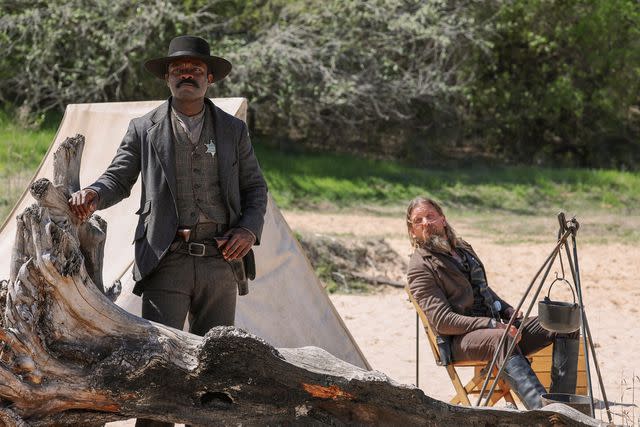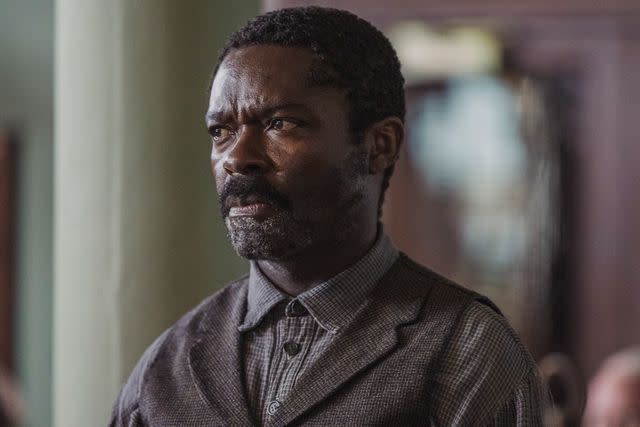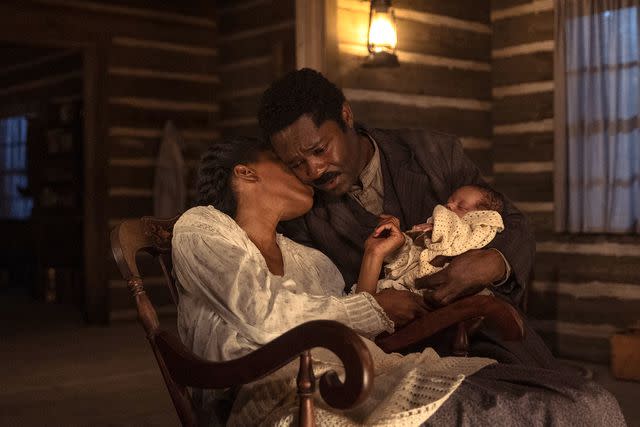David Oyelowo on “Bass Reeves”' terrifying Mr. Sundown storyline and the 'release' of his Golden Globes nom
"I got a little overwhelmed," the actor tells EW. "Bass Reeves has been a long journey. It’s been a hard climb to get the show made."
It took nearly a decade for David Oyelowo to get a story about Bass Reeves, the former slave who would go on to become the first Black deputy U.S. marshal, to the screen.
His retelling of the remarkable true story of the legendary lawman comes to a close in Sunday’s triumphant finale of Lawmen: Bass Reeves on Paramount+ — and with that, his third Golden Globes nomination for his performance as the noble hero grappling with the moral and spiritual cost of the badge.
“I got a little overwhelmed because Bass Reeves has been a long journey. It’s been a hard climb to get the show made," Oyelowo recalls to EW over Zoom a day after nomination announcements.
Production, too, was physically and emotionally demanding. “We shot on old plantations that felt like they had ghosts of the past on there, which was debilitating in relation to the subject matter,” Oyelowo, also an executive producer, says. In receiving a nomination he says, “I think there was a release to see the work being acknowledged in this way,” adding, “It was a beautiful moment.”

Lauren Smith/Paramount+
David Oyelowo and Barry Pepper in 'Lawmen: Bass Reeves'The final episodes see the unmasking of Mr. Sundown, the murderous and supposed cannibalistic slave catcher, as none other than Texas Ranger Esau Pierce (Barry Pepper) — as in, the soldier who kills young Curtis in the premiere episode. It all comes to a head in the finale. Below, Oyelowo talks about the storyline and the difficult journey to get Reeves’ story to the screen.
ENTERTAINMENT WEEKLY: Bass’ story has been about nine years in the making for you. What were some of the obstacles that prolonged its journey to the screen?
DAVID OYELOWO: We had a different industry then. If you're going to tell a period story like Bass Reeves, it's either going to be a movie or on cable like HBO. It’s too expensive to be theatrical. It’s a Black protagonist, so we don't know that America is going to embrace it, and it touches on some deep issues around race, politics, culture, so there was just an allergic reaction from the industry. We took it out in 2015 and 2017, everyone said no. I had an obsession with the idea that this amazing human being — who some suggest may have been the inspiration for the Lone Ranger, who happened to Black — must enter the lexicon of our thinking; not just in America, but globally. I just didn't let it go. In the meantime, Paramount was having real success with Yellowstone, so it became evident that there is an audience. The question is: is there an audience for a Black historical protagonist? I don't know how many times we have to prove as people of color that we are the global majority and that people will embrace it, but it's still a thing. I am just grateful to Paramount for taking the dive with us.

Emerson Miller/Paramount+
David Oyelowo in 'Lawmen: Bass Reeves'You blend history with horror in the last half of the season with the introduction of Mr. Sundown. Was this character based on any real person in particular?
It's made up, but it's based on accounts of terrible things that were going on during that time. We took the circumstances of that period and built it into the story. You have the Reconstruction era, which is where most of our story takes place. You see the Civil War at the beginning, after the Civil War, and then it's before Jim Crow. There were a lot of people who wanted to wind the clock back to slavery and keep people in that state. Mr. Sundown represents a mindset. They found burial sites where, post-slavery, people were buried on plantations where they were illegally still being kept as slaves. There were people who didn't know the war was over for years. News didn't spread the same way it does now, so that's the environment [where] someone like Mr. Sundown can exist.
There's a hopeful resolution, with Bass making it home, too. Were there any other alternative endings?
We played a lot with what the ending should be. For a moment we thought, should we keep it open-ended in case there are going to be other seasons? We ended up feeling like this should be an anthology. The idea is to now go forward and explore other lawmen whose stories we should know, but don't. My hope is it's not going to be Wyatt Earp or Billy the Kid [but rather] folks you go, “Woah, there's Bass Reeves and now there's this guy that we didn't know about!” — preferably people of color, because there were a lot of us there at that time. When we hit that decision, it felt right to put a button to the Bass Reeves story. This is a guy who had a 32-year career. You want to hint at the fact that there is a future for him, but for our story, this hopefully is a satisfying conclusion of getting a taste of who Bass Reeves is.

Emerson Miller/Paramount+
Lauren E. Banks and David Oyelewo in 'Lawmen: Bass Reeves'What was the biggest challenge of playing him?
He means a lot to a lot of people. Doing some of my research in Texas, to Black cowboys, he is their Michael Jackson. He is what Sidney Poitier is to me, he is their guy. You recognize the bar for doing it justice is high, so that can be intimidating. There’s [also] a physical component. He was an amazing horseman. I rode horses for over a year in preparation for this, in lots of different terrain. Just being true to the history and not shying away from the darkness within the history. I believe the light shines brightest in the dark. So you have to contextualize what it was like to be an enslaved person, what it was like to be under those incredibly dangerous circumstances, but also how amazing it was that he had the level of success he did [and a] robust family life. These things coexisting are extraordinary. Telling the truth of all of those things was intimidating.
This interview has been edited and condensed for clarity. All episodes of Lawmen: Bass Reeves are streaming on Paramount+.
Sign up for Entertainment Weekly's free daily newsletter to get breaking TV news, exclusive first looks, recaps, reviews, interviews with your favorite stars, and more.
Related content:
Barbie, Oppenheimer lead 2024 Golden Globes nominations: See the full list
Kaley Cuoco, David Oyelowo get their own Mr. & Mrs. Smith in Role Play trailer
Lawmen: Bass Reeves boss on creating the first series dedicated solely to the iconic gunslinger
Read the original article on Entertainment Weekly.

 Yahoo News
Yahoo News 
